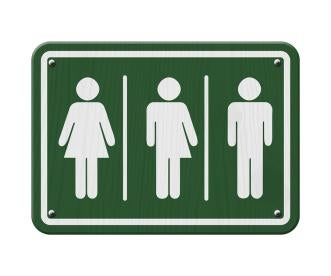How will the Trump administration handle discrimination cases involving transgender employees? The EEOC’s pursuit of a sex discrimination claim on behalf of Aimee Stephens, a transgender woman who was terminated by a Michigan funeral home for expressing her intention to dress in conformance with her gender identity, will be an early indicator.
In a brief filed with the Sixth Circuit on January 26, 2017, Stephens argues that the interests of transgender individuals will not be adequately represented under the new administration. Under the Obama administration, the EEOC sued Stephens’ former employer, R.G. & G.R. Harris Funeral Homes, for sex discrimination on her behalf. The funeral home owner argued permitting Stephens to dress as a woman would conflict with his Christian beliefs and pose a threat to his free exercise of religion. The Eastern District of Michigan dismissed the EEOC’s lawsuit in August 2016 on the grounds that the funeral home is exempt from Title VII under the Religious Freedom Restoration Act (“RFRA”). Although the EEOC appealed to the Sixth Circuit in October 2016, Stephens filed a motion to intervene as plaintiff-appellant, citing her belief that the new administration would not adequately represent her interests.
Over the course of Obama’s presidency, the trend in federal government was the extension of protections for transgender individuals. Many federal agencies, including the EEOC, OFCCP, OSHA, and HHS, previously promulgated rules and guidance affording increased protections for transgender individuals. Numerous federal courts, including the First, Sixth, Ninth, and Eleventh circuits, have applied theories of sex stereotyping under Section 1983 or Title VII, resulting in protections for transgender individuals. Few courts, however, have found gender identity or transgender status is a protected class under Title VII. Indeed, the district court in G.R. & R.G. Funeral Homes rejected that position when presented by the EEOC.
Whether the EEOC will continue to aggressively pursue the expansion of Title VII to include transgender protections remains an open question. While still just a rumor, it has been reported that the Trump administration is considering an executive order that would provide individuals and organizations the ability to deny employment, as well as services and other benefits, to LGBT individuals on religious grounds. In her motion, Stephens references the removal of the White House webpage dedicated to LGBT rights, the federal government’s requests for extensions of time in other civil rights cases, and the President’s authority over EEOC appointments as reasons she believes her interests may not be adequately represented. Further, the current acting chair of the EEOC, Victoria Lipnic, was one of two commissioners who voted against the EEOC’s July 2015 decision that held that sexual orientation is included within the definition of sex for discrimination purposes under Title VII. The Trump administration also has rescinded guidance previously issued by the departments of Education and Justice under the Obama administration that took the position that the Title IX prohibitions of discrimination “on the basis of sex” require access to sex-segregated facilities based on gender identity.
On the other hand, the EEOC filed its opening brief with the Sixth Circuit just two weeks after Stephens moved to intervene, arguing that (a) discrimination based on transgender status and/or transitioning is inherently sex discrimination under Title VII; and (b) the RFRA does not provide the for-profit funeral home a defense in this case. This stance is consistent with that taken by the EEOC while Obama was in office. Further, Trump has indicated Executive Order 13672, which banned federal contractors from discriminating against LGBT employees, will stand.
Stephens’ case may have implications for the protection of transgender employees at the federal level, but employers need to keep in mind that many states explicitly prohibit discrimination against transgender workers. At least sixteen jurisdictions – including California, Illinois, Maryland, Massachusetts, New Jersey and the District of Columbia – now include gender identity as a protected characteristic under their discrimination laws.
Employers are advised to familiarize themselves with their state and local laws, to take a proactive role in preventing transgender, or gender identity, discrimination in the workplace, and to have a plan in place to accommodate the potential needs of transgender workers.




 i
i

